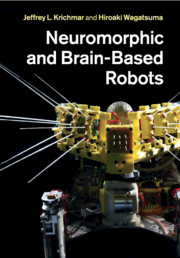Book contents
- Frontmatter
- Contents
- Contributors
- Preface
- Part I Introduction
- Part II Neuromorphic robots: biologically and neurally inspired designs
- 2 Robust haptic recognition by anthropomorphic robot hand
- 3 Biomimetic robots as scientific models: a view from the whisker tip
- 4 Sensor-rich robots driven by real-time brain circuit algorithms
- Part III Brain-based robots: architectures and approaches
- Part IV Philosophical and theoretical considerations
- Part V Ethical considerations
- Index
- References
4 - Sensor-rich robots driven by real-time brain circuit algorithms
from Part II - Neuromorphic robots: biologically and neurally inspired designs
Published online by Cambridge University Press: 05 February 2012
- Frontmatter
- Contents
- Contributors
- Preface
- Part I Introduction
- Part II Neuromorphic robots: biologically and neurally inspired designs
- 2 Robust haptic recognition by anthropomorphic robot hand
- 3 Biomimetic robots as scientific models: a view from the whisker tip
- 4 Sensor-rich robots driven by real-time brain circuit algorithms
- Part III Brain-based robots: architectures and approaches
- Part IV Philosophical and theoretical considerations
- Part V Ethical considerations
- Index
- References
Summary
Introduction
The analysis of particular telencephalic systems has led to derivation of algorithmic statements of their operation, which have grown to include communicating systems from sensory to motor and back. Like the brain circuits from which they are derived, these algorithms (e.g. Granger, 2006) perform and learn from experience. Their perception and action capabilities are often initially tested in simulated environments, which are more controllable and repeatable than robot tests, but it is widely recognized that even the most carefully devised simulated environments typically fail to transfer well to real-world settings.
Robot testing raises the specter of engineering requirements and programming minutiae, as well as sheer cost, and lack of standardization of robot platforms. For brain-derived learning systems, the primary desideratum of a robot is not that it have advanced pinpoint motor control, nor extensive scripted or preprogrammed behaviors. Rather, if the goal is to study how the robot can acquire new knowledge via actions, sensing results of actions, and incremental learning over time, as children do, then relatively simple motor capabilities will suffice when combined with high-acuity sensors (sight, sound, touch) and powerful onboard processors.
Information
- Type
- Chapter
- Information
- Neuromorphic and Brain-Based Robots , pp. 58 - 84Publisher: Cambridge University PressPrint publication year: 2011
